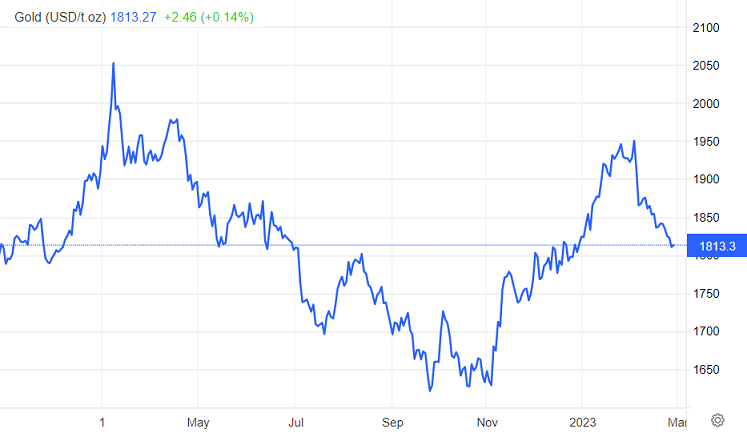Gold outperformed almost all other asset classes in Australian dollar terms in 2022 and there are reasons to believe it can outperform again this year.
Looking back at 2022
Last year, the price of gold experienced three distinct phases. The Ukraine invasion and surging inflation pushed gold prices higher during the opening three months of the year.
Gold price (USD/t.oz) 1 Jan 2022 - 26 February 2023

Source: Trading Economics
The solid start softened from mid-April. Pressured by rising interest rates and the rocketing value of the US dollar, prices trended downwards with little reprieve until the beginning of November.
The turning point for gold arrived on 2 November when the US Federal Reserve hiked its benchmark rate by 75 basis points to 4%. With Chairman Jerome Powell appearing steadfast in his determination to target 2% inflation, the news increased investor jitters about a possible global recession.
In short, sentiment in the gold market turned positive, prices rapidly recovering losses to finish December at US$1,812.35, up US$3.30 on the year.
We now know that central banks also started buying up large amounts of gold and, coincidentally, pressure was heaped on gold-rival bitcoin with the collapse of FTX crypto exchange.
Will gold thrive in 2023?
Investor interest in gold is dependent on a number of factors.
Historically, gold has had a negative correlation to stocks and other financial instruments, making it an effective portfolio diversifier.
While fiat currency is likely to lose purchasing power to inflation over time, the price of gold tends to rise in line with inflation. Thus, in periods of higher inflation, it’s viewed as a good store of value.
Gold has typically performed strongly in periods of financial market stress, making it a simple and effective hedge against market, geopolitical and event risk.
Furthermore, gold has provided sound long-term returns. Using average closing prices, the price of gold rose from US$279 in 2000 to US$1,800 in 2022, providing an annual average gain of 8.8%.
The question now is, will the gold price trend seen in late 2022 continue during 2023? And one of the key factors to watch will be whether the Fed pivots on interest rates.
What is a Fed pivot?
A ‘Fed pivot’ occurs when the US central bank reverses its policy outlook and changes course, which in the current scenario would be from a contractionary (tight) to an expansionary (loose) monetary policy.
According to some experts, the Fed can rarely keep tight policy as long as it wants to because inevitably something will happen that threatens the stability of the financial system.
Already we have seen lower rate rises in order to relieve pressure on businesses and the markets. Because revised monetary policy usually takes weeks or months for its effects to be felt, some say an actual cut in interest rates in order to avoid a hard landing may be prudent sooner rather than later.
Analysts at Bank of America have said that should this occur, it’s likely a falling US dollar (in which gold is denominated) and treasury yields will encourage more investors to buy bullion across 2023:
“BofA says the price could exceed $2,000 an ounce next year as of all the precious metals “gold has the most to gain…on a Fed pivot”.
At this point, the picture remains unclear with divergent views on how long the Fed will continue to hike rates. Even so, it’s likely many investors are already preparing for the inevitable change of tack.
A safe haven
Gold appears to be one sector with the potential for further growth. While fears of recession and central bank buying may provide support for gold going forward, a less hawkish Fed should see a weaker US dollar – which may help to drive gold prices higher in 2023.
Sources: World Gold Council, LBMA, ASX, Investopedia, Reuters.
The Perth Mint ETP PMGOLD is designed to track the international price of gold in Australian dollars and offers investors a simple way to access the returns on the precious metal.
Sawan Tanna is the Treasurer of The Perth Mint, a sponsor of Firstlinks. The information in this article and the links provided are for general information only and do not contain all information that may be material to you making an investment decision. The Perth Mint is not a financial adviser and nothing in this article constitutes financial, investment, legal, tax or other advice. You should consider seeking independent financial advice to check how the information in this article relates to your unique circumstances.
For more articles and papers from The Perth Mint, click here.